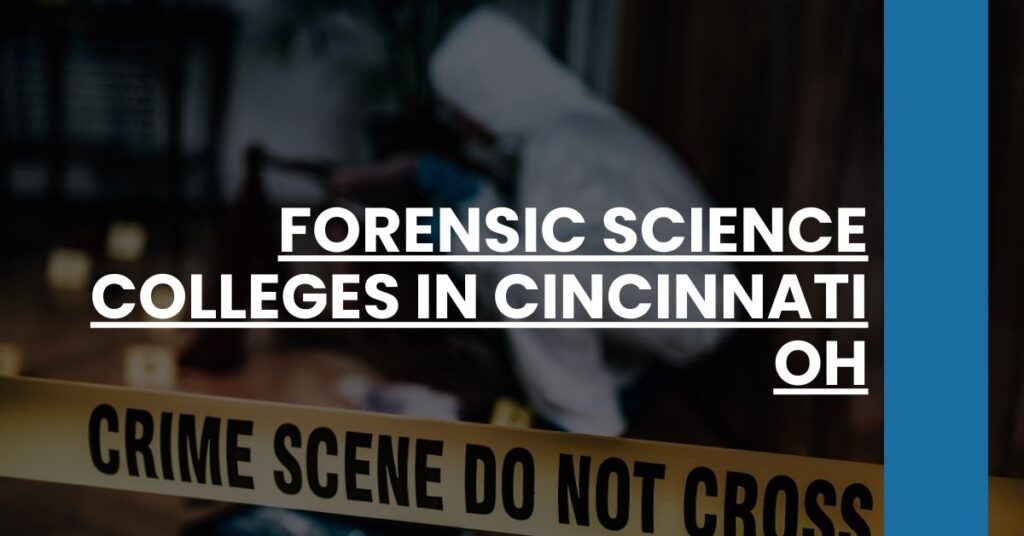Not in Cincinnati? Check out our lists of Forensic Science Colleges in Akron, Cleveland, Columbus, Dayton, Toledo, and across Ohio.
Are you looking for top-notch Forensic Science Colleges in Cincinnati, OH, to prepare for a dynamic career in criminal justice?
This article highlights the finest institutions in Cincinnati that offer exceptional programs in forensic science, providing you with essential skills and hands-on experience.
University of Cincinnati – Forensic Pathology Residency Training
The University of Cincinnati offers a Forensic Pathology Residency Training program located in Blue Ash. This program equips you with practical skills and knowledge in forensic autopsy through comprehensive training and hands-on experiences.
Key Features:
- Resident Training: Work alongside board-certified forensic pathologists, honing your skills in forensic autopsy.
- Educational Activities: Participate in diverse learning experiences such as observing court testimonies and scene investigations.
- Expert Faculty: Receive guidance from experienced pathologists like Benjamin Criss, D.O.; Dorothy Dean, M.D.; Karen Looman, D.O.; Jennifer Schott, M.D.; and Russell Uptegrove, M.D.
Additional Benefits:
- Hands-On Experience: Gain valuable real-world insights by working at the state-of-the-art Hamilton County Coroner’s Office and Crime Laboratory.
- Networking Opportunities: Engage with professionals in the field, providing a strong foundation for future career opportunities.
To learn more about the Forensic Pathology Residency Training program at the University of Cincinnati, visit their program page.
Cincinnati State – Criminal Justice Program
Cincinnati State offers a Criminal Justice program designed to prepare you for varied roles in law enforcement, corrections, and the legal system. Their AAS degree in Criminal Justice is structured to be practical and career-focused.
Program Highlights:
- Curriculum: Courses include criminal law, investigation techniques, ethics, and juvenile justice.
- OPOTA Option: Specialized training through the Ohio Peace Officer Training Academy for peace officer certification.
- Experienced Faculty: Learn from professionals with substantial field expertise.
Hands-On Learning:
- Internships: Apply classroom knowledge in real-world settings through internships and field experiences.
- Practical Exercises: Engage in activities that mimic real criminal justice scenarios, enhancing your practical skills.
Flexible and Affordable:
- Scheduling Options: Day, evening, and online courses available to accommodate your schedule.
- Cost-Effective Tuition: Affordable rates compared to other institutions, making it a viable option for many students.
While there are many benefits to Cincinnati State’s Criminal Justice program, it’s crucial to evaluate if it aligns with your career aspirations and meets admission requirements, such as a background check.
To explore more about the Criminal Justice program at Cincinnati State, visit their official page.
Conclusion
In reviewing forensic science colleges in Cincinnati, OH, consider the unique offerings of each program. Each institution offers specialized training and opportunities essential for building a successful career in forensic science. Evaluate program features, hands-on experiences, faculty expertise, and financial factors to find the best fit for your educational journey. Whether you choose the University of Cincinnati’s Forensic Pathology Residency or Cincinnati State’s Criminal Justice program, each path offers valuable opportunities and experiences. Take the first step in your forensic science career by researching these programs and making an informed decision.
Xavier University – Forensic Science Program
Xavier University in Cincinnati, OH, offers a wide-ranging Forensic Science program. This program blends coursework in biology, chemistry, criminal justice, and psychology to provide a thorough understanding of forensic science principles and methodologies.
Program Highlights:
- Interdisciplinary Approach: Combines subjects like biology, chemistry, criminal justice, and psychology.
- Hands-On Learning: Engages students in laboratory work and crime scene investigations.
- Experienced Faculty: Learn from professionals with practical experience in forensic science.
Specializations:
- Forensic Biology: Focuses on biological analysis related to forensic evidence.
- Forensic Chemistry: Centers around chemical analysis techniques for handling forensic samples.
- Digital Forensics: Offers expertise in the recovery and investigation of material found in digital devices.
Networking Opportunities:
- Internships and Collaborations: Connect with local law enforcement and forensic laboratories for internships and practical experiences.
- Cutting-Edge Education: Stay updated with the latest advancements and technology in forensic science.
Considering a degree from Xavier University’s Forensic Science program can enhance your career prospects due to the institution’s strong reputation and its comprehensive curriculum. Keep in mind, tuition can be higher since it is a private university, so financial planning is essential.
Visit Xavier University to explore more about this program.
How to Choose the Best Forensic Science College
Choosing the best forensic science college involves several important considerations. Here’s a guide to help you make an informed decision:
- Accreditation:
- Faculty Expertise:
- Hands-On Training:
- Class Sizes and Facilities:
- Specializations:
- Financial Aspects:
- Location and Networking:
- Student Reviews and Success Rates:
Choosing the right forensic science college requires careful consideration of these factors to align with your educational and career goals.
Conclusion
Cincinnati, OH offers several top-tier forensic science programs to prepare you for a successful career. The University of Cincinnati provides an in-depth Forensic Pathology Residency Training program with hands-on experience. Cincinnati State offers a practical and cost-effective Criminal Justice program. Xavier University’s comprehensive Forensic Science program emphasizes interdisciplinary learning and real-world applications.
Evaluate each program based on accreditation, faculty expertise, hands-on training opportunities, specializations, financial aspects, location, networking opportunities, and student reviews. This will help you make an informed decision to support your career aspirations in forensic science.
Explore these programs further to find the one that fits your needs and take the next step towards your educational journey in forensic science.

